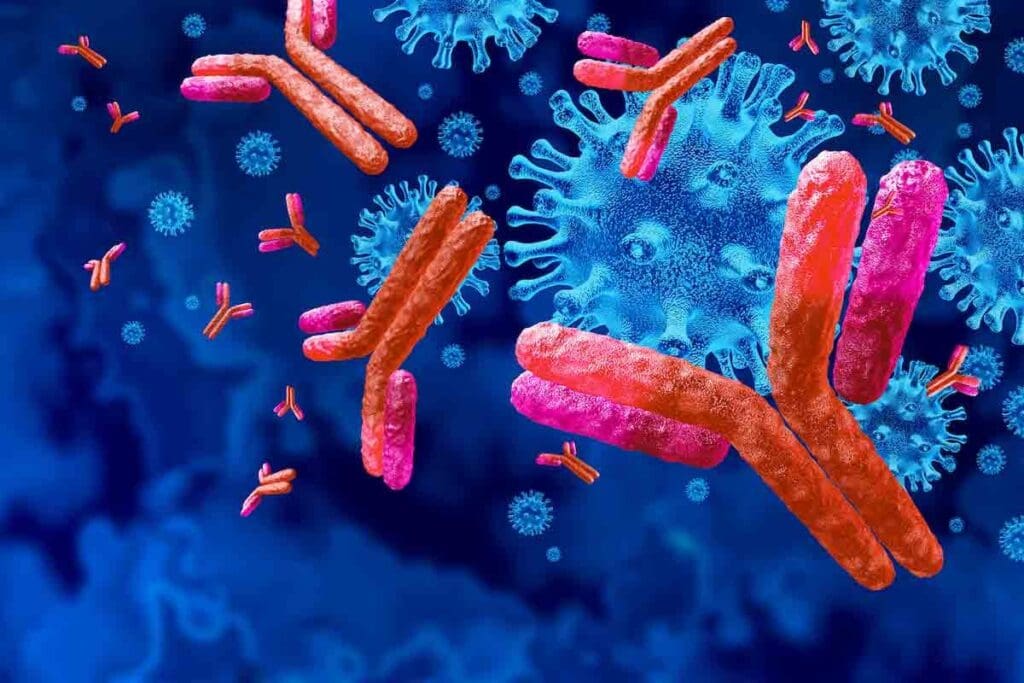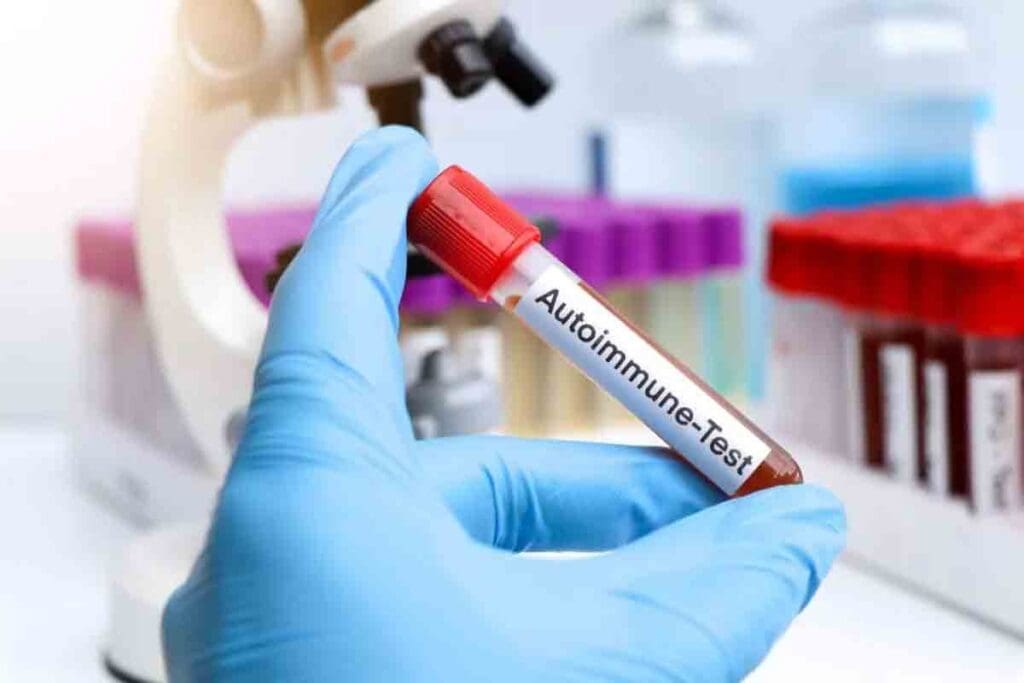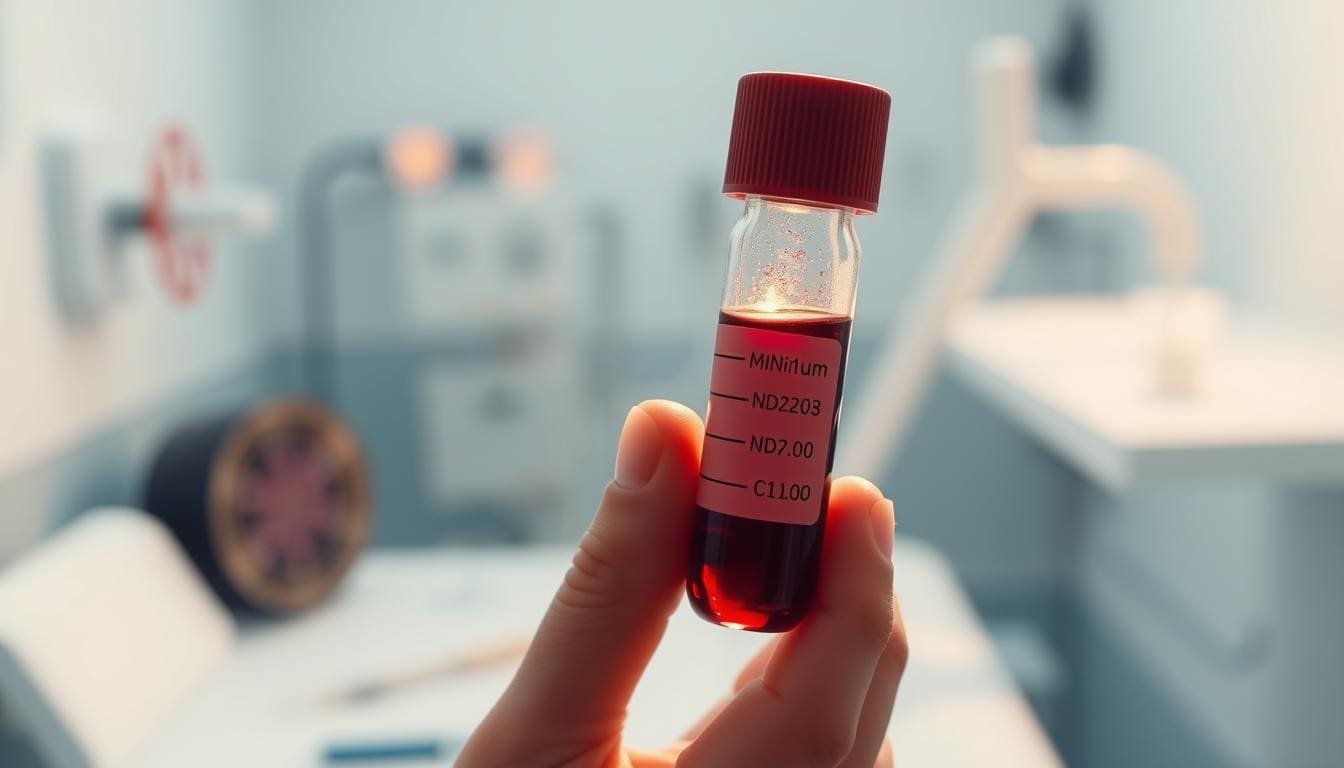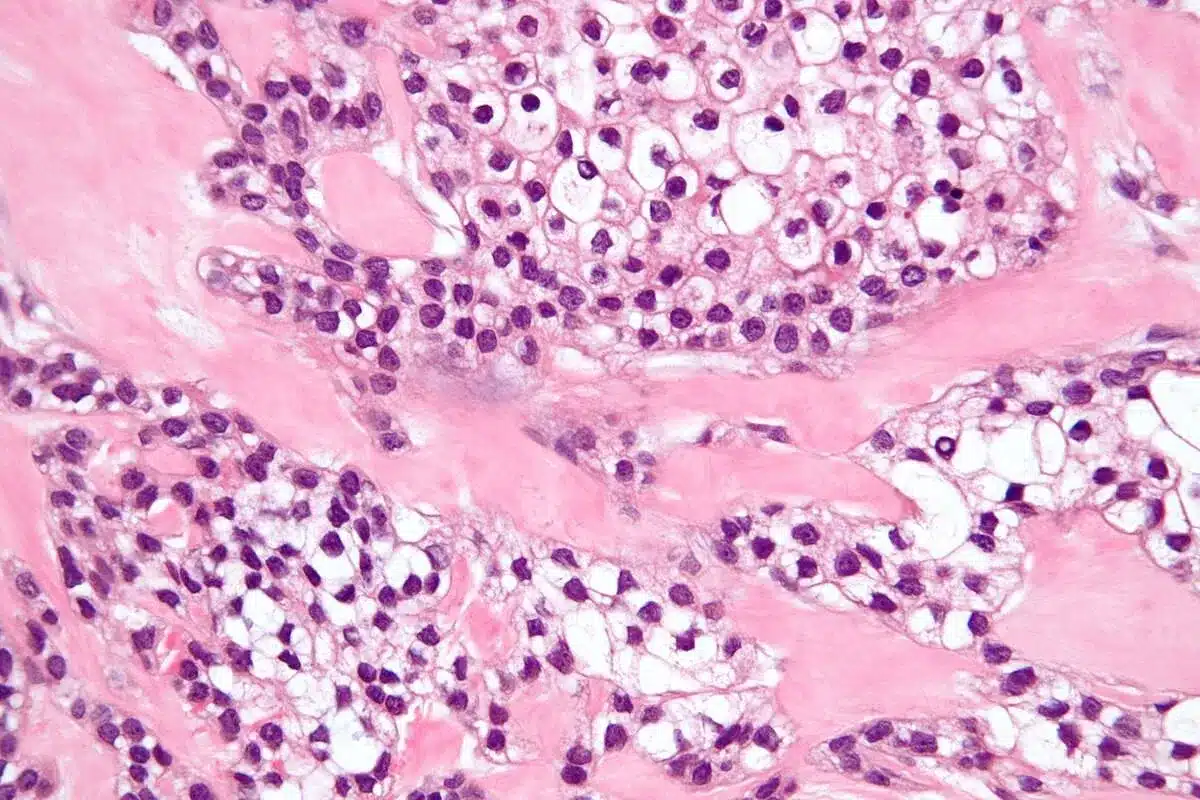
Autoimmune conditions can deeply affect our health. One often overlooked issue is iron deficiency. We’re learning more about how autoimmune diseases and nutritional deficiencies are linked. It’s clear that iron is key to our immune system.
About 10 percent of anemia cases are due to autoimmune diseases. This shows how important this link is. At Liv Hospital, we focus on top-notch care for those with autoimmune disease and iron deficiency.
Key Takeaways
- Autoimmune diseases can lead to iron deficiency.
- Iron deficiency can make autoimmune conditions worse.
- Getting the right diagnosis is key to treatment.
- Liv Hospital offers detailed care for autoimmune disease and iron deficiency.
- It’s important to understand the link between autoimmune diseases and iron deficiency for our health.
Understanding the Connection Between Autoimmune Diseases and Iron Deficiency

Autoimmune diseases and iron deficiency are linked in many ways. This includes chronic inflammation and how the immune system works. Autoimmune diseases happen when the body’s immune system attacks itself. This can mess with how the body uses iron.
Iron is key to making hemoglobin, which carries oxygen. The immune system helps control iron levels. If it doesn’t work right, an iron deficiency can happen.
The Immune System’s Role in Iron Regulation
The immune system manages iron levels in several ways. Hepcidin, made by the liver, is a big part of this. It controls how much iron is absorbed and stored.
When the immune system is active, it makes more hepcidin. This means less iron is absorbed and more is stored. This can lower iron levels in the blood, even if there’s enough iron stored.
How Autoimmunity Disrupts Iron Metabolism
Autoimmune diseases mess with iron metabolism because of chronic inflammation and immune system problems. This can cause anemia of chronic disease. It’s when iron levels are low, but there’s enough iron stored.
| Mechanism | Effect on Iron Metabolism |
| Increased hepcidin production | Reduced iron absorption, increased iron sequestration |
| Chronic inflammation | Altered iron distribution, reduced serum iron |
| Immune system dysregulation | Impaired iron homeostasis |
It’s important to understand how autoimmunity affects iron levels. This helps doctors find better ways to treat iron deficiency in patients with autoimmune diseases.
Fact 1: Autoimmune Disease Iron Deficiency Is More Common Than You Think

Autoimmune disease, iron deficiency are more common than you might think. It affects a lot of patients. The link between autoimmune diseases and iron deficiency is complex.
Research shows iron deficiency is common in people with autoimmune diseases. This is because these diseases cause chronic inflammation and immune problems.
10% of Anemia Cases Attributed to Autoimmune Causes
About 10% of anemia cases are caused by autoimmune diseases. This shows how big a role autoimmune diseases play in anemia and iron deficiency.
Anemia means not enough healthy red blood cells to carry oxygen. Autoimmune disease anemia is hard to manage because of immune system problems.
Up to 70% of Autoimmune Patients Experience Anemia
Up to 70% of autoimmune disease patients have anemia. This is much higher than in the general population. It shows healthcare providers need to watch iron levels closely in these patients.
Anemia in autoimmune disease patients affects their health and quality of life. Managing iron deficiency and anemia is key to better outcomes.
Understanding iron deficiency in autoimmune diseases helps healthcare providers. They can then develop better strategies for diagnosis, treatment, and management. This includes checking iron levels, using supplements, and treating the autoimmune disease.
Fact 2: Chronic Inflammation Drives Iron Depletion in Autoimmune Conditions
In autoimmune conditions, chronic inflammation is a major cause of iron loss. These diseases often cause a long-lasting inflammatory response. This can greatly affect how the body uses iron.
The Inflammatory Response and Iron Sequestration
When the immune system is turned on, it starts an inflammatory response. This is meant to protect us, but in autoimmune diseases, it can be ongoing. It leads to iron deficiency among other problems.
The inflammation traps iron in certain cells. This makes it hard for the body to use iron for making blood cells.
This trapping is the body’s way of keeping iron from pathogens. But it ends up causing iron deficiency anemia in autoimmune patients.
Hepcidin: The Master Regulator of Iron
Hepcidin is a protein that controls iron in the body. It helps decide how much iron is absorbed from food and released from stores. During long-term inflammation, hepcidin levels go up. This means less iron is absorbed and more is trapped.
- Hepcidin binds to ferroportin, stopping iron from being released from cells.
- This leads to lower iron levels in the blood.
- More hepcidin is linked to anemia of chronic disease.
Understanding hepcidin’s role in autoimmune-related iron deficiency is key. By focusing on hepcidin and reducing inflammation, doctors can help manage iron deficiency in autoimmune patients.
Fact 3: Specific Autoimmune Diseases With High Iron Deficiency Rates
Iron deficiency is common in many autoimmune diseases. It happens because of chronic inflammation, immune system problems, and issues with iron use.
Rheumatoid Arthritis and Iron Status
Rheumatoid arthritis (RA) is a long-term autoimmune disease that often leads to iron deficiency anemia. The ongoing inflammation in RA causes more hepcidin, a protein that controls iron. This makes iron hard to get for making red blood cells.
Studies have shown that up to 30% of RA patients get anemia, with iron deficiency playing a big role.
Inflammatory Bowel Disease and Iron Absorption
Inflammatory bowel disease (IBD), including Crohn’s disease and ulcerative colitis, is also linked to iron deficiency. The inflammation in the gut makes it hard to absorb iron and causes ongoing blood loss. This makes iron deficiency worse.
Effective management of IBD is key to preventing iron deficiency and its complications.
Other Autoimmune Conditions Affecting Iron Levels
Other autoimmune diseases, like systemic lupus erythematosus (SLE) and celiac disease, also affect iron levels. In SLE, chronic inflammation and possible kidney problems can lead to anemia and iron deficiency. Celiac disease, caused by an immune reaction to gluten, damages the small intestine and hinders nutrient absorption, including iron.
It’s important to know which autoimmune diseases often lead to iron deficiency. This knowledge helps doctors spot and treat these issues early. By understanding the connection between these diseases and iron levels, healthcare providers can help patients better.
Fact 4: Is Anemia an Autoimmune Disease? Understanding the Distinction
Anemia is not an autoimmune disease itself. But some types of anemia are linked to autoimmune issues. Anemia happens when there are not enough red blood cells or they are not good enough. These cells carry oxygen around our body.
It’s important to know the difference between anemia alone and its connection to autoimmune diseases. This helps doctors diagnose and treat it better.
Autoimmune Hemolytic Anemia Explained
Autoimmune Hemolytic Anemia (AIHA) is a type of anemia caused by the immune system. It makes antibodies that attack and destroy red blood cells. This leads to fewer healthy red blood cells, causing anemia.
AIHA can be caused by other health problems, like infections or cancers. Doctors use tests and exams to diagnose it. Treatment aims to stop the immune system from attacking red blood cells and manage symptoms.
Secondary Iron Deficiency in Autoimmune Disease
Autoimmune diseases can also cause secondary iron deficiency. This happens because chronic inflammation affects iron metabolism. Even with enough iron in the diet, iron levels can drop.
This makes anemia worse. To tackle this, doctors need to treat the autoimmune disease and replenish iron. They also watch how the patient responds to treatment. This approach helps improve health and quality of life.
Fact 5: How Low Iron Impacts Immune Function and Disease Progression
Iron deficiency affects how well the immune system works, which is key in managing autoimmune diseases. Iron is needed for many body functions, including a strong immune system. In autoimmune diseases, where the immune system attacks the body, iron’s role is even more important.
Iron’s Role in Immune Cell Development
Iron is essential for making and working immune cells like lymphocytes and macrophages. These cells help fight off infections. Iron deficiency can weaken the immune system by affecting these cells. Studies show iron helps control how these cells grow and change.
A study found, “Iron deficiency can weaken the immune system, making us more likely to get sick.”
“Iron plays a key role in the immune system, and not having enough can harm how it works.”
Increased Infection Risk with Autoimmune Disease, Low Iron
People with autoimmune diseases and low iron are more likely to get infections. Their immune systems are already weakened by the disease and lack of iron. This combination can make it hard for the body to fight off infections. It’s important for doctors to keep iron levels in check when treating autoimmune diseases.
Understanding how low iron affects the immune system and disease progression helps us manage autoimmune diseases better. Keeping iron levels right is a big part of caring for people with these conditions.
Fact 6: Recognizing Symptoms of Autoimmune-Related Iron Deficiency
Autoimmune diseases and iron deficiency can cause a mix of symptoms. It’s important to know the common signs and the special challenges they bring.
Classic Iron Deficiency Symptoms
Iron deficiency, with or without autoimmune diseases, shows up in several ways. These include:
- Fatigue and Weakness: This is a common symptom because the body can’t make enough hemoglobin.
- Shortness of Breath: Not enough hemoglobin means less oxygen for tissues and organs.
- Pale Skin: Less hemoglobin makes the skin look pale because of less blood flow.
- Dizziness or Lightheadedness: Iron deficiency can make it hard to keep blood pressure steady.
Unique Symptoms in Autoimmune Contexts
In autoimmune diseases, iron deficiency can show up differently or be hidden by other symptoms. For example:
- Exacerbation of Autoimmune Symptoms: Iron deficiency can make autoimmune symptoms worse, making diagnosis harder.
- Muscle Pain and Weakness: Muscle pain from diseases like rheumatoid arthritis can get worse with iron deficiency.
Doctors say iron deficiency in autoimmune diseases makes diagnosis and treatment more complex.
When to Seek Medical Attention
If you have symptoms that might be iron deficiency, and you have an autoimmune disease, see a doctor. Early treatment can make a big difference.
Key Indicators to Seek Medical Help:
- Persistent or worsening fatigue
- Increased shortness of breath
- Dizziness or fainting spells
Knowing the symptoms of autoimmune-related iron deficiency and when to get medical help is key. It helps manage the condition and improve life quality.
Fact 7: Treatment Approaches for Iron Deficiency in Autoimmune Disease Patients
Dealing with iron deficiency in autoimmune diseases needs a complete plan. This plan should tackle the iron issue and the disease itself. We’ll look at iron supplements, managing the disease, and changing diets.
Oral vs. Intravenous Iron Supplementation
Iron supplements are key in treating iron deficiency. There are two main ways to get iron: through the mouth or directly into the veins.
- Oral Iron Supplementation: This is the most common and easiest way. But it might not work for everyone, like those with severe deficiencies or stomach problems.
- Intravenous Iron Supplementation: This is for those who can’t take oral iron or have very low iron levels. It quickly fills up iron stores.
We’ll talk about the good and bad of each method to find the best one for each patient.
Managing the Underlying Autoimmune Condition
It’s important to manage the autoimmune disease to fix the iron deficiency. This means:
- Immunosuppressive Therapy: This reduces inflammation and immune activity. It helps iron absorption and use.
- Disease-Modifying Antirheumatic Drugs (DMARDs): These drugs control the disease. They might also help iron levels.
By controlling the disease, we make it easier to add iron and improve health.
Dietary Strategies for Improving Iron Status
Diet is key in managing iron deficiency. We suggest:
- Increasing Iron-Rich Foods: Eat foods high in iron, like red meat, poultry, fish, beans, lentils, and fortified cereals.
- Enhancing Iron Absorption: Vitamin C boosts iron absorption. So, eating foods high in vitamin C with iron-rich foods is good.
- Avoiding Inhibitors of Iron Absorption: Foods like tea, coffee, and milk can block iron absorption. It’s best to eat them apart from iron-rich foods.
By using these diet tips, iron supplements, and managing the disease, patients can improve their iron levels.
Diagnosis and Monitoring of Iron Status in Autoimmune Disease Patients
Getting the iron status right is key to managing autoimmune diseases well. We must know the lab tests and markers that show iron levels in these patients.
Key Laboratory Tests and Biomarkers
There are several lab tests for checking iron levels in autoimmune disease patients. These include:
- Serum Iron: Shows the amount in the blood.
- Ferritin: Tells us about the body’s iron stores.
- Transferrin Saturation: Shows how much iron is bound to transferrin.
- Complete Blood Count (CBC): Helps spot anemia and other blood issues.
These tests give us important information on a patient’s iron levels. This helps us make treatment plans that fit their needs.
Frequency of Monitoring Recommendations
How often to check iron levels depends on several things. These include the disease’s severity, anemia presence, and treatment response. Generally, we suggest:
- Checking iron status every 3-6 months for those with stable autoimmune disease.
- Checking more often (every 1-3 months) for those with active disease or on treatments that affect iron.
By keeping a close eye on iron levels, we can tweak treatments. This helps improve patient outcomes and quality of life.
Conclusion: Taking Control of Your Iron Health With Autoimmune Disease
Managing iron deficiency is key to good health, even more so for those with autoimmune diseases. Studies show iron deficiency anemia can weaken the immune system and affect mental and physical health. A study on the National Center for Biotechnology Information website notes it’s a big problem worldwide, hitting 50% of people in developing countries.
It’s important to understand how autoimmune diseases and iron deficiency are linked. Conditions like rheumatoid arthritis and inflammatory bowel disease often lead to iron deficiency. Spotting the signs of iron deficiency linked to autoimmune diseases and getting medical help can greatly help with treatment. By tackling autoimmune iron deficiency, people can manage their condition better and live a fuller life.
To manage your iron health, you need to work closely with your doctor. This might include tests to check your iron levels and adjust treatments as needed.
FAQ
What is the relationship between autoimmune diseases and iron deficiency?
Autoimmune diseases can cause iron deficiency. This happens because chronic inflammation messes with how our body uses iron. This can lead to anemia.
Is anemia an autoimmune disorder?
Anemia isn’t always caused by autoimmunity. But some types of anemia, like autoimmune hemolytic anemia, are linked to autoimmunity.
How does chronic inflammation drive iron depletion in autoimmune conditions?
Chronic inflammation makes our body produce hepcidin. This protein controls iron use. It leads to iron being locked away, causing a lack of iron.
What are the symptoms of iron deficiency in autoimmune disease patients?
Symptoms include fatigue, weakness, and pale skin. Shortness of breath can also happen. These symptoms vary based on the disease.
How is iron deficiency diagnosed in autoimmune disease patients?
Doctors use tests like serum ferritin and iron levels to diagnose. They might need to check these levels often to see how iron levels are doing.
What are the treatment approaches for iron deficiency in autoimmune disease patients?
Treatment includes iron supplements and managing the disease. Eating foods rich in iron can also help.
Can dietary changes help improve iron status in autoimmune disease patients?
Yes, eating more iron-rich foods and vitamin C can help. Avoiding tea and coffee can also be good for iron levels.
How does low iron impact immune function in autoimmune disease patients?
Low iron can weaken the immune system. This makes it harder to fight off infections and can make symptoms worse.
Are there specific autoimmune diseases that are more commonly associated with iron deficiency?
Yes, diseases like rheumatoid arthritis and inflammatory bowel disease often have iron deficiency. This is because of chronic inflammation and poor iron absorption.
How often should iron status be monitored in autoimmune disease patients?
How often to check iron levels depends on the disease, treatment, and patient needs. But it’s important to check regularly to avoid and manage iron deficiency.
References
- Marques, O., & Pasricha, S.-R. (2022). The role of iron in chronic inflammatory diseases. Free Radical Biology and Medicine, 184, 152-167. https://www.sciencedirect.com/science/article/pii/S0006497122010862








